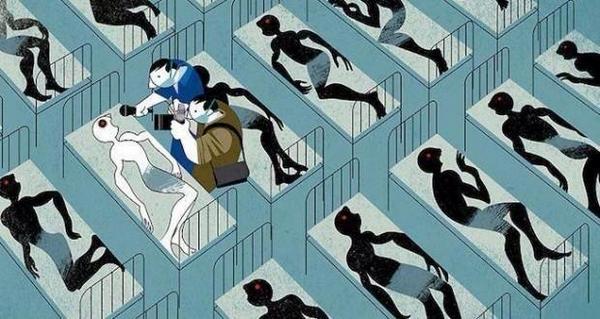How Ebola Is Spreading Racism

This western perception of Africa as a place riddled with diseases is nothing new and with the recent outbreak of Ebola that has already claimed over 4,000 lives and sprung up in the United States, the panic is beginning to set in, and it has a decidedly racial tone.
While racist Ebola fears were once contained to Twitter and conflicting news headlines, now they are beginning to have visceral effects on people beyond the realms of the Internet. In Dallas, where Thomas Eric Duncan, the first person to die of Ebola in the United States, passed away, a group of African immigrant children have been stigmatized as the "Ebola kids" simply because of their ethnicity. Dallas City Council member Jennifer Staubach Gates publicly stated that African immigrants in the Vickery Meadow neighborhood have reported being turned away from jobs and from retail locations. One Ethiopian man, who gave his name as "Ayob" and works in downtown Dallas, claimed that, "Some guy told me 'go get yourself quarantined'," the man assuming that because Ayob was African, that he must be a risk for Ebola, despite the fact that there has never been a case of Ebola reported in Ethiopia.
While the number of reported instances of discrimination against African immigrants and refugees in the United States are still few and far between, they threaten to grow as the fear of Ebola grows. These instances are also symptomatic of a larger problem.
West Africa and Africa as a whole are being characterized in international news, particularly in the United States and Europe, as threats to global health. It should go without saying that three countries in western Africa do not represent west Africa and especially not all of Africa, which is a massive continent with over a billion people living in 54 recognized countries and other territories. However, the mounting mass hysteria surrounding Ebola has, in many Americans’ minds, reduced an entire continent (and subsequently its people) down to this one disease. As CNN journalist Robin Wright wrote, "The disease is persistently portrayed as West African, or African, or from countries in a part of the world that is racially black, even though nothing medically differentiates the vulnerability of any race to Ebola." Unsurprising, as many Americans perceive Africa as one big country. Some airports now warn travelers that if they have recently been in any part of Africa and feel any flu-like symptoms, they should tell an official or go to the hospital in case they have Ebola. With misleading information like that along with general attitudes toward Africa, it's not shocking that tourism in Africa, including east and southern Africa, has been hit hard. But it is disheartening and eye-opening to see just how much generalizing a countinent and its people can have acute consequences.
Less and less are we concerned with the humanity and suffering of the thousands of Liberians, Guineans and Sierra Leoneans directly affected by Ebola and its collateral effects as the panic over a U.S. outbreak builds. We are, however, viewing those people more and more as just the carriers, representations and causes of the disease. The collusion of misinformation, already existing U.S. racism, persisting myths about Africa, disease stigma and fear are resulting in both implicit and outright racism against black people.
The fear of an outbreak of a fatal disease spreading and the desire to protect oneself are understandable survival drives. However, the amplification of this fear into collective panic has led to a xenophobic and international dehumanization of Africans. For example, in Austria of all places, there has been a growing fear of and rise in discrimination against black Africans, even though those immigrants have as much of a chance of contracting Ebola as white Austrians. But because we are dealing with a frequently deadly disease, racism and discrimination (which can result in critical and deadly consequences for some) are being overlooked.
As stated before, this type of racism isn’t new. Similar generalizing and scape-goating happened during and after the AIDS epidemic. It happened when one of my high school classmates laughed that to stop the spread of HIV/AIDS, all people with the disease should be quarantined in Africa. For some people, such as ex-PR executive Justine Sacco, HIV/AIDS is still a vicious punch line in jokes about Africans, Africa and black people.
At a time like this, instead of contributing to panic and dehumanization, we should be contributing to education and empathy, for both those abroad and here at home. As it's already be proven, people can catch Ebola regardless of race and those people should be viewed as human beings, not as walking agents of bio warfare. Treating strangers as diseased because of their color while additionally lacking any actual knowledge about their health is inhumane. It also doesn't make you safer. Generalizing groups of people (especially one as large and diverse as "Africans") only causes harm and fuels the belief in stereotypes and myths that give power to racism and discrimination. In the United States, we are on the cusp of the critical point of Ebola; it's unclear if the disease will be contained or if it will spread. But one thing we certainly don't have to spread is racism. We should be fighting that disease along with Ebola.
The "War at Home" is a project of co-columnists Corinne Gaston and Maya Richard-Craven to examine and discuss contemporary issues of discrimination, violence and social injustice within American borders.
Contact Deputy Opinion Editor Corinne Gaston here; or follow her on Twitter.



